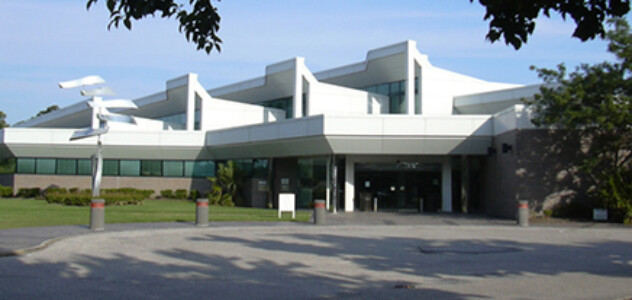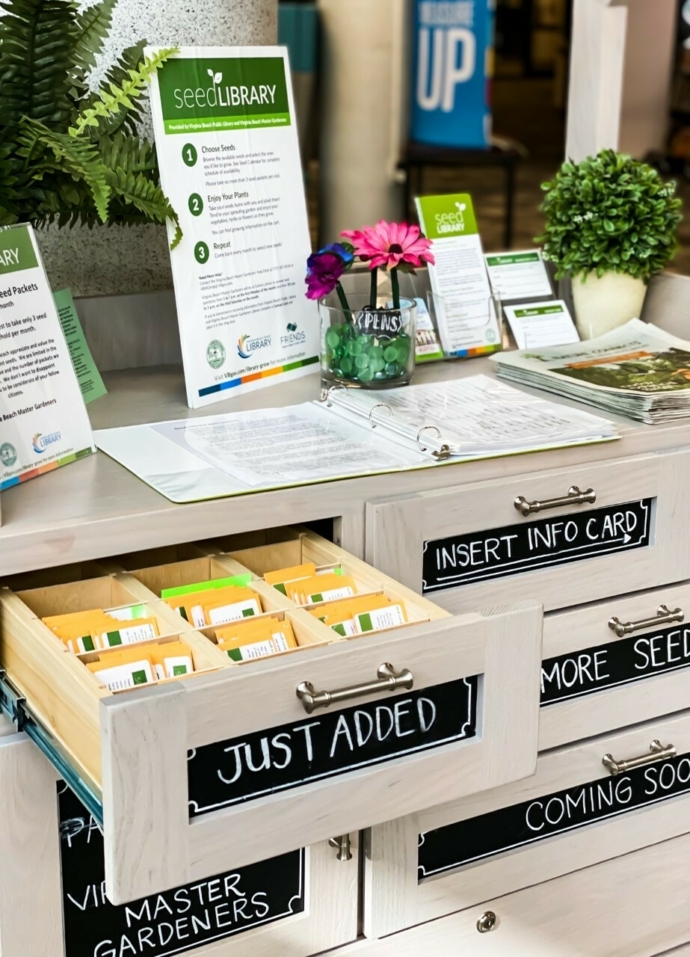What is a Seed Library?
A Seed Library is a curated collection of seeds made freely available to the public for home gardens. Virginia Beach Public Library and Virginia Beach Master Gardeners have partnered to create the Seed Library available to you at Meyera E. Oberndorf Central, Kempsville, and Princess Anne libraries.
Enjoy harvesting your own herbs and vegetables or admiring flowers grown in your own backyard—while helping ensure a diversity of plants growing in our community.
When is the Seed Library open?
The Seed Library is available when the Central, Kempsville, and Princess Anne libraries are open.
What kind of seeds are available?
Each month the Master Gardeners will stock the Seed Library with new herb, vegetable and flower seeds. The seeds have been donated by several sponsors in our community (see Sponsors tab).
Each packet provides a short description of the plant and how to care for it. Please take no more than three packets per visit. Any remaining packets from prior months can be found in the "More Seeds" drawer.
Still have questions?
The Master Gardeners' Help Desk is available for all your gardening queries at (757) 385-8156 or VBMGhelp@vbgov.com.
Thank you and have fun growing!
All information courtesy of Sow True Seed.
Heirloom
Varieties of seeds have been passed down through generations due to their outstanding qualities such as unique flavor, disease resistance, or storability. These varieties have been in circulation since World War II, prior to the commercial introduction of F-1 hybrids and the changes that resulted in the domination of “Big Agriculture.”
Hybrid
A hybrid seed is created when the pollen from two different plant varieties are crossed. The resulting cross produces the traits desired by the breeder, for example, this is how seedless watermelons are created. Subsequent generations of seed, however, if saved, will not grow “true-to-type” when replanted the following season.
In some instances, the hybridization of plant varieties has helped to create new varieties that are helpful to farmers, including disease resistance, higher sugar content, and more tolerance to extreme temperature fluctuations. Most of the fruit and vegetable varieties you see in the grocery store are hybrids.
Organic
Seeds that are never treated with fungicides or pesticides of any kind and are certified by the USDA as organic, open pollinated, non-hybrid, non-GMO varieties of seeds that will grow true to type when saved properly and replanted.
Open-pollinated varieties are more genetically diverse and are able to adapt faster to their growing region and specific climate variances. Each open-pollinated variety remains protected in the public domain as the common property of everyone.
Seed Viability
While seed packets are printed with a “sell by” date, many experienced gardeners know this is merely a suggestion. When stored under the right conditions (cool, dark, and dry) many seed varieties can remain viable for years.
Thank you to the following suppliers for donating seeds to the Seed Library:
- Baker Creek Heirloom Seeds
- Botanical Interests Seeds
- Burpee Seeds
- Fedco Seeds
- High Mowing Seeds
- John Scheepers Seeds
- Johnny's Selected Seeds
- Lake Valley Seeds
- Prairie Moon Nursery Seeds
- Rare Seeds
- Seed Savers Exchange
- Select Seeds
- Southern Exposure Seed Exchange
- Sow True Seed
- Sustainable Seed Company
- Sweet Yards Seed Company
- Territorial Seed Company
- True Leaf Market Seeds





